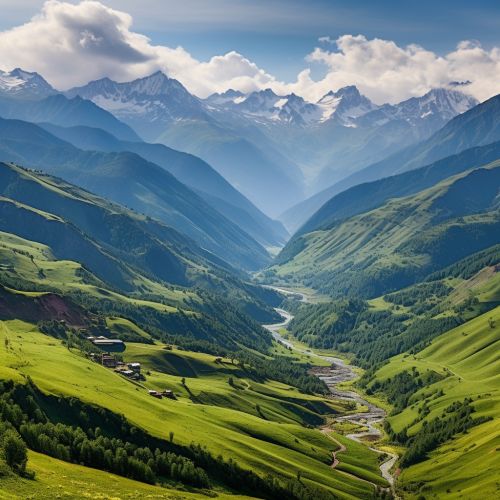Economy of the Caucasus
Overview
The Caucasus region, situated between the Black Sea and the Caspian Sea, is known for its diverse economic landscape. It comprises three countries: Armenia, Azerbaijan, and Georgia, each with its unique economic characteristics and challenges. The region's economy is primarily driven by natural resources, agriculture, and services, with varying degrees of industrialization and development.


Natural Resources
The Caucasus region is rich in natural resources, particularly in Azerbaijan, where oil and gas reserves play a significant role in the economy. The Caspian Sea is a major source of these resources, with Azerbaijan being one of the world's top oil producers. In addition to oil and gas, the region is also known for its mineral resources, including gold, copper, and molybdenum, which contribute significantly to the economies of Armenia and Georgia.
Agriculture
Agriculture is another key sector in the Caucasus economy. The region's diverse climate and fertile soil allow for the cultivation of a wide range of crops. In Georgia, viticulture is particularly prominent, with the country being one of the oldest wine regions in the world. Armenia, on the other hand, is known for its fruit production, particularly apricots, while Azerbaijan's main agricultural products include cotton, grains, and livestock.
Services and Tourism
The services sector, including tourism, is a growing part of the Caucasus economy. Georgia, in particular, has seen a significant increase in tourism in recent years, with its rich history, diverse culture, and stunning landscapes attracting visitors from around the world. Armenia and Azerbaijan are also developing their tourism sectors, offering unique cultural experiences and natural beauty.
Industrialization and Development
The level of industrialization and development varies across the Caucasus. While Azerbaijan has a well-developed oil and gas industry, Armenia and Georgia have more diversified economies, with a focus on light industry, food processing, and manufacturing. However, all three countries face challenges in terms of economic development, including issues related to infrastructure, corruption, and political instability.
Economic Challenges
Despite its economic potential, the Caucasus region faces several challenges. These include geopolitical tensions, particularly between Armenia and Azerbaijan, which can impact economic stability and growth. Additionally, issues such as corruption, lack of infrastructure, and economic inequality can hinder development. However, efforts are being made to address these challenges and promote economic growth and stability in the region.
Future Prospects
The future of the Caucasus economy largely depends on how effectively the region can overcome its challenges and capitalize on its strengths. Continued development of the services sector, particularly tourism, could provide significant economic benefits. Additionally, sustainable management of natural resources and efforts to diversify the economy could also contribute to future growth and stability.
